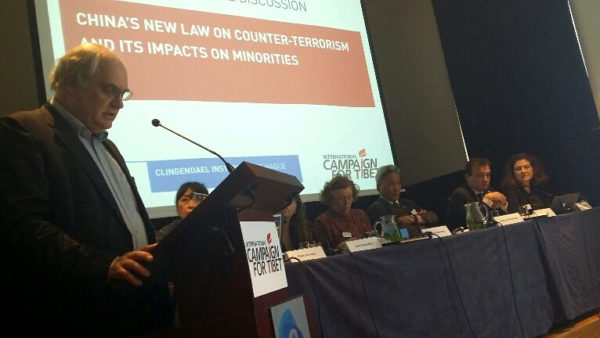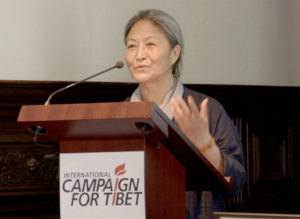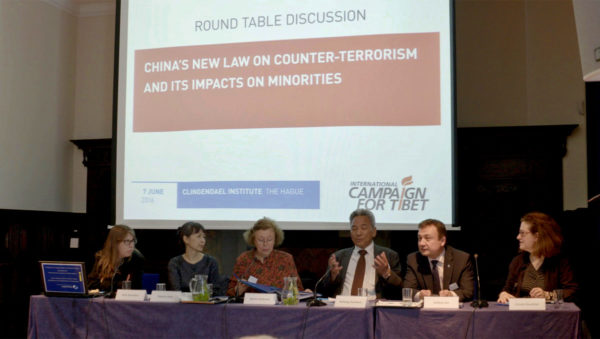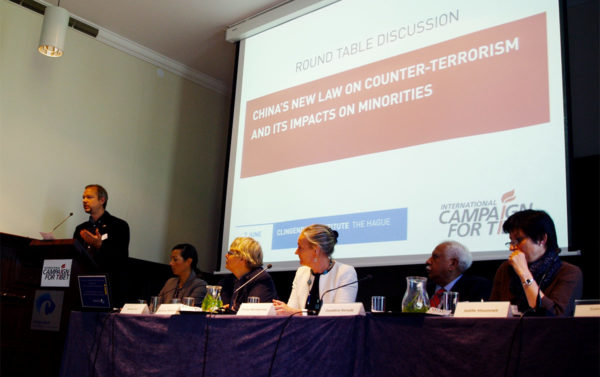
Ko Colijn, Director of the Clingendael Institute, during his Welcome Speech to the roundtable.
Following the adoption of a highly controversial law on counter-terror in China at the end of last year, the International Campaign for Tibet (ICT) held a high-level roundtable discussion on the issue on 7 June 2016.
The event, “China’s new Counter-Terrorism Law and its Impacts on Minorities”, which took place at the Clingendael Institute in The Hague, aimed at exploring the scope of the new legislation that came into force on 1 January 2016, and in particular its repercussions for groups as Tibetans and Uyghurs.

Tsering Jampa, ICT-Europe Executive Director

The first panel of the event. From left to right: Kate Saunders, ICT’s Communications and Research Director; Sharon Hom, Executive Director of Human Rights in China; Marie Holzman, Sinologist and President of “Solidarité Chine”; Kelsang Gyaltsen, Representative of HH the Dalai Lama; Dolkun Isa, Executive Chairman of the World Uyghur Congress; and Ursula Gauthier, former Beijing correspondant of the NouvelObs.
The roundtable brought together a varied panel of speakers, including national and EU officials, researchers, academic experts, journalists and representatives from Non-Governmental Organisations: Mr. Jayadeva Ranade, President of the Indian Centre for China Analysis and Strategy; Ms. Sharon Hom, Executive Director of Human Rights in China; Mr. Kelsang Gyaltsen, Special Representative of His Holiness the Dalai Lama to Europe; Ms. Ursula Gauthier, former Correspondent of the French newspaper NouvelObs in Beijing: Ms. Joëlle Hivonnet from the China Division of the European External Action Service; Gabriel Lafitte, Australian researcher and environmentalist; Jessica Carl, Political Officer at US Permanent Mission to the United Nations in Geneva; Garrie van Pinxteren, Sinologist and Senior visiting fellow at the Clingendael Institute; Dolkun Isa, Executive Chairman of the World Uyghur Congress; and Kate Saunders, ICT’s Communications and Research Director. The two panels were moderated by Marie Holzman, Sinologist and President of the French association “Solidarité Chine”, et Christa Meindersma, former ICT Board Member.
The discussion provided a good understanding of the domestic political context in which the new counter-terrorism law was adopted, including a strong obsession of the Chinese leadership with control and stability and the way the law is deeply rooted in the broader Chinese security policy and security architecture. Speakers also analyzed the individual provisions of the law curtailing the rights of groups such as Tibetan and Uyghurs, and noted the counter-productive character of the legislation, which instead of bringing stability, as sought by the Chinese authorities, is likely to create more resentment and opposition from these ethnic groups.
The international dimension of the issue was also discussed, in particular with regards to China’s push to cooperate on the issue with third States and regional or international organizations. Speakers agreed on the necessity to understand the Chinese real motivations and interested behind this push, and raised the importance of a coordinated and united approach towards these offers of agreements or dialogues on counter-terrorism with China.
An emphasis was also put on the possibilities for follow-up on this issue, including the monitoring of the law’s implementation regulations and the development of new and ambitious methods to counter China’s “divide and conquer” strategy.
“The path chosen by Beijing – more oppression and more militarization – is very dangerous because it is destined to fuel resentment and further alienates an already distressed population. Democratic governments cannot and should not support the counterterrorism operations in Tibet and instead should make it clear that a distinction exist between terrorist activities and legitimate political dissent”, Executive Director of ICT-Europe Tsering Jampa said.
Around 80 people attended the event, among which were diplomats, representatives from NGOs, Chinese dissidents, representatives of the Tibetan and the Uyghur communities, academics and journalists.
Following this roundtable, ICT will issue a report later this year, with key recommendations for China and foreign policymakers. “We are at the start of this discussion and it should be brought much more to the public attention. This is also why ICT organised this event, and we will continue to work on it with our partners in the future.” said Vincent Metten, ICT’s EU Policy Director, in his closing remarks.

ICT’s EU Policy Director Vincent Metten and the second panel. From left to right: Jessica Carl, Political Officer at the US Mission in Geneva ; Garrie van Pixteren, Garrie van Pinxteren, Sinologist and Senior visiting fellow at the Clingendael Institute; Jayadeva Ranade, President of the Indian Centre for China Analysis and Strategy; and Joëlle Hivonnet from the China Division of the European External Action Service.

